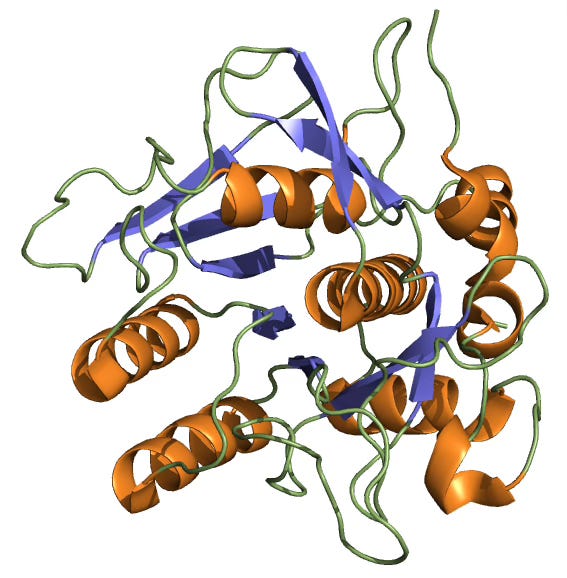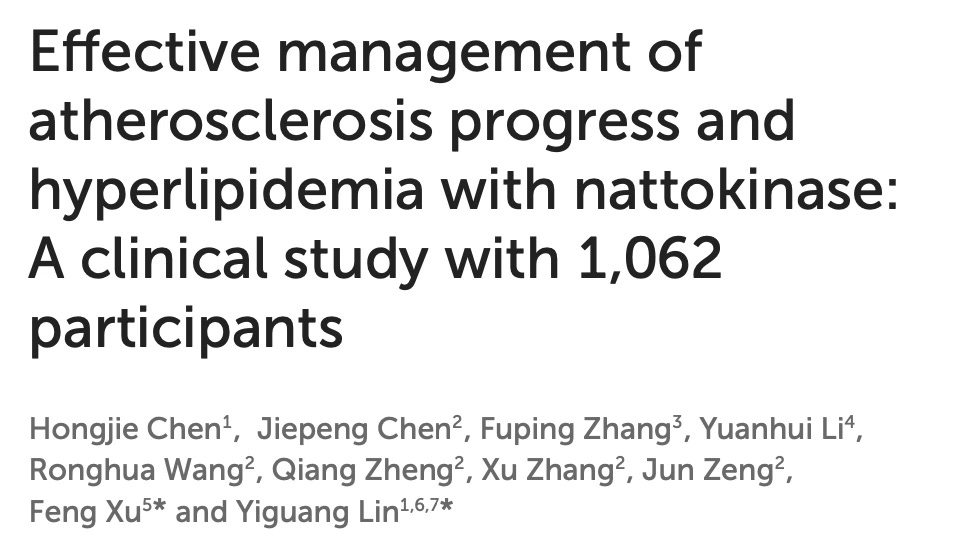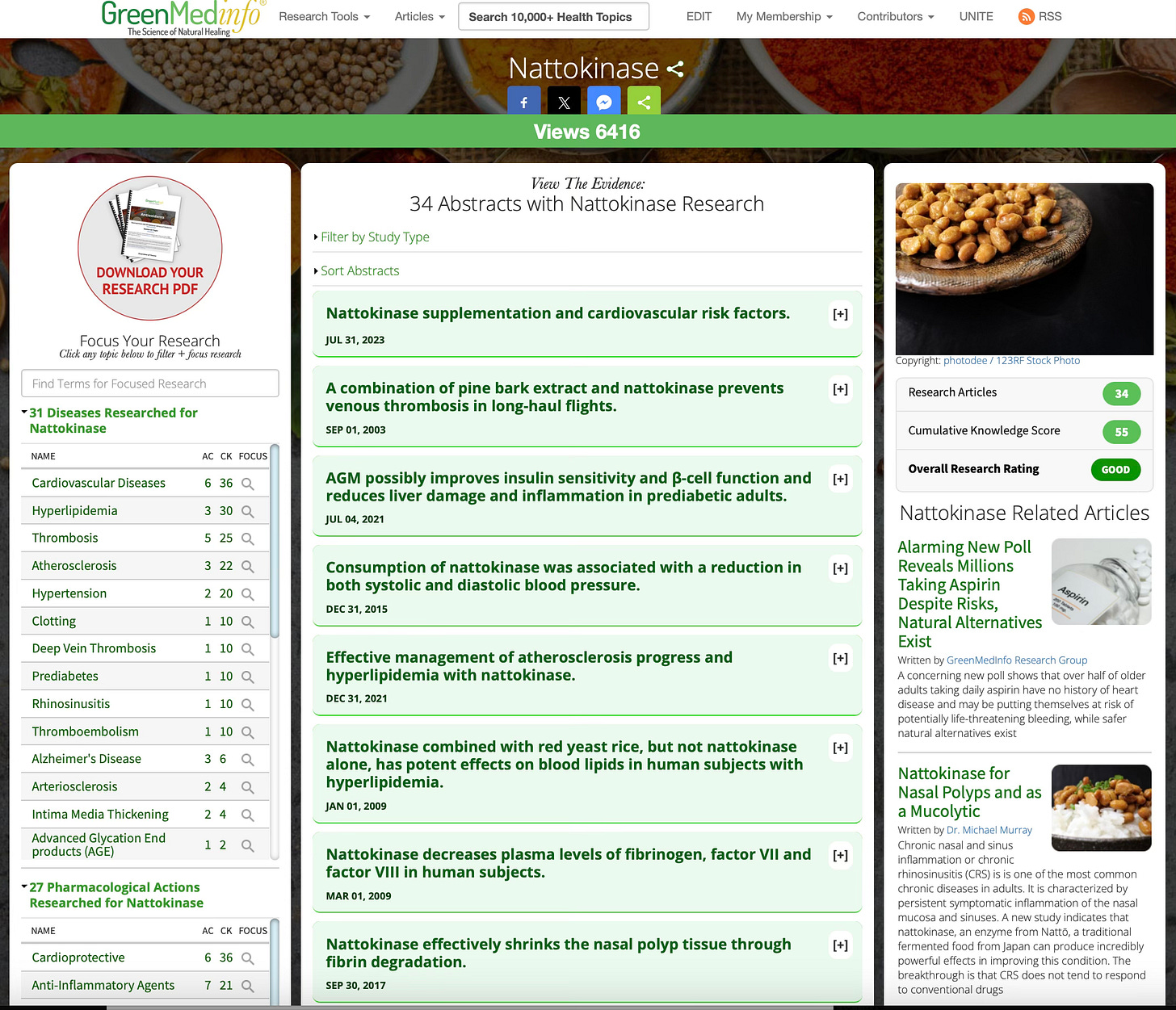Nattokinase REVERSES Heart Disease—But Only If You Take Enough
A landmark clinical study with over 1,000 participants reveals the dose-dependent power of nattokinase to shrink arterial plaque, improve lipid profiles, and do it all without side effects.
Atherosclerosis and the Limits of Mainstream Medicine
Atherosclerosis—the progressive narrowing of the arteries due to plaque buildup—is a leading cause of heart attacks and strokes. For decades, mainstream medicine has leaned heavily on statins and surgical interventions, but these approaches often address symptoms rather than root causes. Worse yet, many patients experience significant side effects from long-term statin use, including muscle pain, liver damage, and increased risk of diabetes. (view evidence of over 300+ statin associated adverse effects here)
The hunt for a safer, natural solution has brought attention to nattokinase (NK)—a fibrinolytic enzyme derived from fermented soybeans (natto). Long valued in traditional Japanese medicine, NK is now under scientific scrutiny for its potential to dissolve blood clots, reduce blood pressure, and reverse plaque accumulation.
The Study: Real-World Evidence in 1,062 Participants
Published in Frontiers in Cardiovascular Medicine, this large-scale clinical study evaluated the effects of nattokinase on atherosclerosis progression and hyperlipidemia over 12 months.[1] Participants took either 10,800 FU (fibrinolytic units) or 3,600 FU per day.
The findings were nothing short of remarkable:
At 10,800 FU/day, NK led to a significant reduction in the thickness of the carotid artery intima-media and the size of carotid plaques.
Plaque regression rates ranged from 66.5% to 95.4% depending on individual factors.
No adverse effects were reported at this high dose.
Conversely, participants taking 3,600 FU/day saw no significant improvement—clearly indicating that the commonly recommended dose may be too low to be effective.
This research strikes at the heart of cardiovascular disease mortality. Unlike statin drugs, which aim to suppress LDL levels without addressing arterial integrity or clot risk, nattokinase directly targets the fibrin matrix and plaque structures responsible for occlusion. It represents a root-cause approach—something sorely missing in modern pharmaceutical paradigms.
Stacking Synergy: K2 and Aspirin Boost NK's Power
Researchers also observed that co-administering vitamin K2 and low-dose aspirin (81 mg) with nattokinase produced a synergistic effect—further improving cardiovascular outcomes. This makes biological sense: K2 helps direct calcium away from arteries and into bones, while aspirin's anti-inflammatory effects may enhance NK's clot-busting potential.
Subjects who exercised regularly, avoided smoking, and limited alcohol intake also saw greater benefits, suggesting that lifestyle optimization amplifies nattokinase's therapeutic potential.
Why This Should Be International News—but Isn't
The implications of this study are revolutionary. Yet the silence from major media outlets is deafening. Why? The answer may lie in intellectual property economics.
Nattokinase is a food-derived enzyme. It cannot be patented. As a result, there’s little financial incentive for pharmaceutical companies to fund or promote research into it, despite its overwhelming safety and efficacy profile. This echoes the long tradition of food as medicine—from garlic and turmeric to fermented foods like natto—where the most healing substances are often the least profitable.
This isn't just a footnote in the alternative health movement. This is evidence-based medicine with the potential to reverse our number one killer. It's time to stop treating plaque as a lifelong sentence and start viewing it as a solvable condition.
The GreenMedInfo Nattokinase Database: More Proof of Heart Healing
GreenMedInfo.com curates one of the largest natural medicine research libraries, and its nattokinase database features over 30 peer-reviewed studies. Here are the top 5 additional studies highlighting nattokinase’s cardiovascular benefits:
Endothelial Protection – NK was shown to reduce endothelial inflammation via SRF and THBS1 signaling, addressing a root trigger of atherosclerosis[2].
Stroke and Neurovascular Recovery – NK promoted neurogenesis and cognitive recovery post-stroke, showing its benefit extends to cerebrovascular circulation[3].
Anti-Hypertensive Effects – Human trials showed significant reductions in both systolic and diastolic blood pressure with oral nattokinase supplementation[4].
Thrombosis Prevention – NK reduced DVT risk in long-haul flights when combined with pine bark extract, highlighting its fibrinolytic and anti-clotting synergy[5].
Cholesterol and Triglyceride Reduction – In combination with red yeast rice, NK substantially improved lipid markers in hyperlipidemic individuals[6].
Together, these findings reinforce nattokinase's multifaceted role in cardioprotection, clot prevention, lipid normalization, and vascular healing.
View the Nattokinase database on Greenmedinfo.com here.
Want to Go Deeper? Discover the Roots of Regeneration
For those interested in exploring the deeper principles of root-cause healing and regenerative medicine, consider:
The REGENERATE Masterclass – a free, expert-led video course exploring the body's innate healing potential.
The book Regenerate by Sayer Ji – a groundbreaking synthesis of modern science and ancient wisdom showing how biology can reverse chronic disease.
This is not just about nattokinase. It’s about reclaiming our health sovereignty and rediscovering the body's intrinsic ability to heal.
References
Chen H, et al. "Effective management of atherosclerosis progress and hyperlipidemia with nattokinase: A clinical study with 1,062 participants." Front Cardiovasc Med. 2022;9:1076420. https://doi.org/10.3389/fcvm.2022.964977
Chiu H-W, et al. "Nattokinase attenuates endothelial inflammation through the activation of SRF and THBS1." Int J Biol Macromol. 2024;268(Pt 2):131779. PMID: 38679250.
Wu H, et al. "Nattokinase promotes post-stroke neurogenesis and cognition recovery." J Agric Food Chem. 2023;71(30):11418–11428. PMID: 37466380.
Jensen GS, et al. "Consumption of nattokinase was associated with a reduction in both systolic and diastolic blood pressure." Integr Blood Press Control. 2016;9:95–104. PMID: 27785095.
Cesarone MR, et al. "A combination of pine bark extract and nattokinase prevents venous thrombosis in long-haul flights." Angiology. 2003;54(5):531–539. PMID: 14565628.
Yang NC, et al. "Nattokinase combined with red yeast rice has potent effects on blood lipids in hyperlipidemia." Asia Pac J Clin Nutr. 2009;18(3):310–317. PMID: 19786378.
GreenMedInfo Research Group. "Nattokinase Research Dashboard." GreenMedInfo. https://greenmedinfo.com/substance/nattokinase







Could you suggest where to purchase this formulation? Thank you.